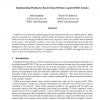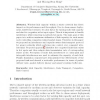804 search results - page 77 / 161 » Uncooperative congestion control |
IWQOS
2005
Springer
14 years 2 months ago
2005
Springer
Most congestion control algorithms try to emulate processor sharing (PS) by giving each competing flow an equal share of a bottleneck link. This approach leads to fairness, and pr...
NDSS
2002
IEEE
14 years 2 months ago
2002
IEEE
Pushback is a mechanism for defending against distributed denial-of-service (DDoS) attacks. DDoS attacks are treated as a congestion-control problem, but because most such congest...
ICCSA
2009
Springer
14 years 3 months ago
2009
Springer
Wireless link capacity within a sensor network has direct impact on its performance and throughput. Due to dense sensor deployment, interference seems to be a key factor for varyin...
CCR
2006
13 years 9 months ago
2006
In this paper, we propose Layered TCP (LTCP for short), a set of simple modifications to the congestion window response of TCP to make it more scalable in highspeed networks. LTCP...
SIGCOMM
2000
ACM
14 years 1 months ago
2000
ACM
The traditional approach to implementing admission control, as exemplified by the Integrated Services proposal in the IETF, uses a signalling protocol to establish reservations a...


